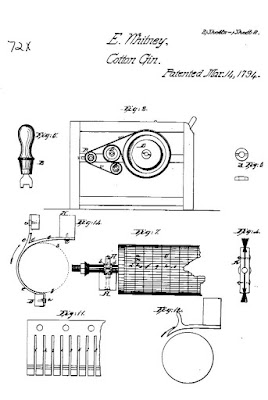March 14, 1794: Eli Whitney patents the cotton gin
 Eli Whitney was born on December 8, 1765 in Westborough, Massachusetts. Whitney spend most of his childhood working various jobs such as in a nail factory and as a farm laborer. During the long work day, he studied machinery and was eventually accepted into Yale University. After graduating in 1792, he traveled to Georgia to begin his career. Post-Revolutionary Georgia was emerging as a growing economic center, presenting new opportunities especially for industrial minded northerners. In Georgia, he went into business with another Yale alum, Phineas Miller. At the turn of the 19th century, Whitney began to invent.
Eli Whitney was born on December 8, 1765 in Westborough, Massachusetts. Whitney spend most of his childhood working various jobs such as in a nail factory and as a farm laborer. During the long work day, he studied machinery and was eventually accepted into Yale University. After graduating in 1792, he traveled to Georgia to begin his career. Post-Revolutionary Georgia was emerging as a growing economic center, presenting new opportunities especially for industrial minded northerners. In Georgia, he went into business with another Yale alum, Phineas Miller. At the turn of the 19th century, Whitney began to invent.
Whitney began tinkering with devices used to produce high cotton crop yield. In the 1790’s, he developed the cotton gin (engine). It was a device that quickly separated the cotton fiber from the stem. Before this, the stem would be taken from the plant and the fiber would have to be manually removed from the stem. The cotton gin would greatly reduce the time for this to happen yielding huge cotton surpluses. The southern crop produced half a million pounds prior to 1800. After invention of the cotton gin, the southern crop production increased tenfold. Whitney patented his invention on March 14, 1794.
The Cotton gin revolutionized the cotton industry in the United States. It would become Whitney’s claim to fame. However, the cotton gin inception produced a horrible consequence. With the cotton gin, the plantation owner was able to produce a much higher yield than was previously able too. Enterprising plantation owners planted bigger fields to produce more cotton. More cotton meant more hands to pick it. African slaves were bought and sold to work on the plantations were “King Cotton” was produced. The number of slaves in southern states greatly increased coinciding with the invention of the cotton gin; and continued to increase as yields grew bigger and bigger.
Eli Whitney’s intention for creating the cotton gin was probably not to expand slavery. He was simply trying to make easier what was once extremely labor intensive. With that said, he must have been somewhat cognizant of the implications his invention allowed for. He would go to become an advocate for the burgeoning mechanical parts industry. In 1817, he married Henrietta Edwards. In 1825, he developed cancer and passed away on January 8th.




Comments
Post a Comment